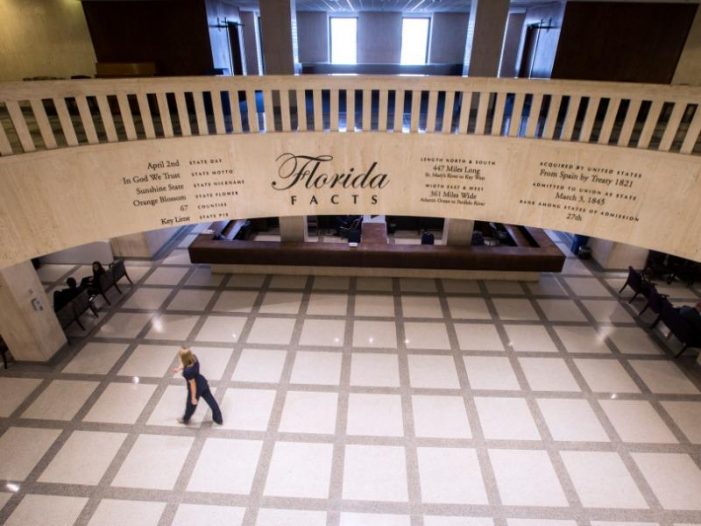TALLAHASSEE — Sen. Bill Galvano became president of the Florida Senate on Tuesday, promising to leave a contentious election behind and to promote a more civil discussion of issues facing the nation’s third-largest state.
Galvano, a 52-year-old Republican lawyer from Bradenton, told the 40-member Senate there is little he can do “to stem the tide of modern-day incivility that has become so pervasive in an era of social media and the 24-hour news cycle.”
“But I can tell you that while I am serving as Senate president, the Florida Senate will have civility, transparency, candor and opportunity, including an opportunity for the people of Florida to be heard,” Galvano said.
Galvano was unanimously elected president during a one-day organization session that included putting in place new House and Senate leaders and swearing in lawmakers. Rep. Jose Oliva, R-Miami Lakes, was also elected Tuesday to serve as House speaker.
Galvano brings a wealth of legislative experience to his presidency. As a House member, he served as a rules committee chairman, oversaw the investigation of a House speaker and helped negotiate a complicated gambling agreement with the Seminole Tribe of Florida.
In the Senate, Galvano has handled the education budget and shepherded a major higher-education package through the Legislature.
But in contrast to outgoing President Joe Negron, a Stuart Republican who made the higher-education package a top priority, Galvano outlined a series of issues where he expects to see legislative initiatives but said he would leave the details to individual senators to develop.
“A presiding officer, in my opinion, should be somewhat of a traffic cop, directing the traffic that comes from the members,” Galvano told reporters after the organization session ended. “I’m not going to dictate to them. They’re going to tell me the direction in which to go.”
Citing Florida’s low unemployment rate and the strength of state budget reserves, Galvano said the Senate over the next two years will “build on our past decisions to keep taxes low, regulations reasonable and to set aside ample reserves, while making smart investments in essential government services.”
Galvano said the state’s ability to expand its economy, allowing it to attract technology as well as tourists, will be “tied to the strength of our infrastructure.” He said that would include investments and support for transportation, communications, water projects and power sources.
Galvano also said he wanted to “maximize” the state’s technical schools and state colleges, helping them focus on graduating students who can move on to higher-paying, skilled jobs.
He said the Senate agenda would include efforts to “provide economic opportunities to our rural communities that make up the spine of our state,” including support for the state’s vast agriculture industry.
But having served 14 years in the Legislature, Galvano warned members that they are likely to face major issues that “have yet to reveal themselves.”
“Last session was certainly no exception,” he said, referring to the Legislature’s response to the mass shooting at a Broward County high school that left 17 students and staff members dead on Feb. 14.
The Legislature, which begins its annual 60-day session on March 5, is already dealing with an issue that was unanticipated when lawmakers ended their 2018 session last March.
Lawmakers will be facing the aftermath of Hurricane Michael, which devastated portions of the Panhandle in October. Galvano said it may represent a $1 billion-plus challenge “that will impact our budgetary and policy decisions out of the gate.”
The Republicans hold a 23-17 seat edge in the Senate.
Senate Democrats unanimously elected Sen. Audrey Gibson of Jacksonville to lead their caucus over the next two years in a vote on Monday night.

